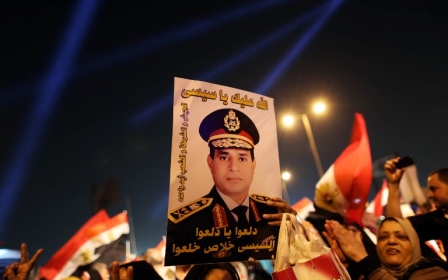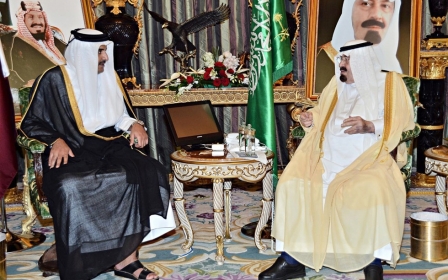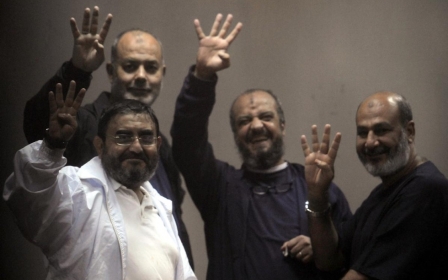Al Jazeera's Egypt channel suspended following Doha-Cairo thaw

The Doha-based Al Jazeera Mubasher Misr news channel, devoted to covering news from Egypt, said Monday that it was suspending broadcasts from the Qatari capital until "conditions are favourable" for resuming work from Egypt.
In a statement, the channel said it had broadcast its last news bulletin from Doha and would close down its Doha office until "conditions are favourable" for resuming broadcasts from Cairo.
The decision appeared to be a direct result of a thaw between Doha and Cairo two days after Egyptian President Abdel Fattah al-Sisi received a Qatari envoy following Saudi mediation.
"It seems that Qatar has been under a lot of pressure from the GCC countries, especially from Riyadh and Abu Dhabi to restore its ties with Egypt," said. Mohammed Mohsen Abo El-Nour, an Egyptian political analyst specialised in international relations.
"I believe Qatar decided to close down the channel completely instead of changing its editorial policies in a move to mend relations with Egypt," he told MEE.
The pan-Arab news broadcaster has been strongly criticised in Egypt over coverage seen as favourable to the Muslim Brotherhood, the movement of ousted Islamist president Mohamed Morsi.
Qatar repeatedly denounced Morsi's removal by the army in July 2013, and still shelters many Brotherhood leaders, including those who have fled a crackdown by authorities in Egypt.
Three Al-Jazeera journalists, including the award-winning Australian Peter Greste, were sentenced to seven years in jail by a Cairo court, accused of supporting the blacklisted Brotherhood, in a verdict condemned worldwide.
In the meantime, Egyptian opposition leaders in Qatar ruled out the possibility that they might be deported – or be subject to restrictive measures – as the result of Saudi-backed mediation efforts between Egypt and Qatar.
"Qatar is not at odds with the Egyptian people," Ehab Shiha, who heads Egypt's Salafist Asala Party and currently resides in Qatar, told The Anadolu Agency.
"Doha manages its foreign affairs in a professional manner; it had no dispute with Egypt. [Egyptian President] Abdel-Fattah al-Sisi is the one who instigated the dispute, because Qatar saw al-Sisi's ouster of Egypt's legitimate president, Mohamed Morsi, as a coup," Shiha said.
"I don't think Qatar will restrict our movement or ask us to leave," he added.
Responding to a question about Qatar's having asked seven senior Muslim Brotherhood members to leave the country in September, Shiha said the move "was not for the sake of al-Sisi, but for other reasons" that he did not specify.
In September, Muslim Brotherhood sources said the Qatari government had asked seven leading members of the group to leave the country, which they did.
Morsi-era Investment Minister Yehia Hamed, a senior Brotherhood member currently residing in Doha, told AA: "We're thankful for anyone who supported our just cause. If their positions have changed, that's their prerogative."
"We've made our decision, which is to continue the [Egyptian] revolution until we win," Hamed said, refraining from clarifying whether he had been asked to leave the country.
Another Muslim Brotherhood source in Qatar who requested anonymity had told AA that "the impact of reconciliation [between Egypt and Qatar] will manifest itself in the [Qatar-based] Al Jazeera channel's Egypt coverage."
"Al Jazeera's adoption of an 'anti-coup' media discourse is what will change; it already began to change on Sunday," he had said.
"Since the deportation of Muslim Brotherhood leaders in September, we agreed with the Qatari state that we would not hold organizational meetings or opposition conferences, to which we agreed out of respect for Qatar," the source said.
The source added that the group's meetings and conferences were now being held outside Qatar, which is why he believes his residency in Doha won't be affected by the country's recent rapprochement with Egypt.
In a previous interview with Al Jazeera, Qatari Assistant Foreign Minister for International Cooperation Mohamed bin Abdulrahman bin Al-Thani said that his country "adopts an open-door policy and welcomes all guests to the country."
"Opposition figures hosted by Qatar are welcome, so long as they don't practice politics. If they wish to do so, they have the choice," he said.
From Egypt's side, Assistant Justice Minister for International Cooperation Adel Fahmi ruled out that the Qatari authorities would "extradite Egyptian fugitives from the Muslim Brotherhood and Al-Gamaa al-Islamiyya who committed or abetted acts of violence and killing following the ouster of Morsi."
"Some believe there could be a breakthrough on the extradition of fugitives to Qatar in light of the resolution of the Qatari-Egyptian dispute, but I think this is unlikely," Fahmi said.
"The Egyptian authorities have sent numerous requests to Qatar to hand over fugitives – such as the head of Al-Gamaa al-Islamiyya Assem Abdel-Majid and Yusuf al-Qaradawi, who chairs the International Union of Muslim Scholars – but they were all met with complete disregard," he said.
"We are currently drafting new requests for the extradition of Assem Abdel-Majid and the rest of the fugitives to Qatar and they will be sent on an urgent basis," he added.
Relations between Cairo and Doha deteriorated markedly since July of last year, when Mohamed Morsi – Egypt's first elected president – was ousted by the army following opposition protests.
Egypt had accused Doha of interfering in its affairs by supporting the Muslim Brotherhood – the group from which Morsi hails – and by hosting a number of wanted Brotherhood figures following Morsi's ouster.
In a September interview with CNN held on the sidelines of the United Nations General Assembly in New York, Qatari Emir Sheikh Tamim bin Hamad described Morsi's ouster as a "military coup."
Cairo has been especially irked by Qatar's view of political developments in Egypt, and what it describes as biased news coverage by Qatar's Al-Jazeera Mubasher Misr channel, which is devoted to covering Egypt news.
New MEE newsletter: Jerusalem Dispatch
Sign up to get the latest insights and analysis on Israel-Palestine, alongside Turkey Unpacked and other MEE newsletters
Middle East Eye delivers independent and unrivalled coverage and analysis of the Middle East, North Africa and beyond. To learn more about republishing this content and the associated fees, please fill out this form. More about MEE can be found here.




